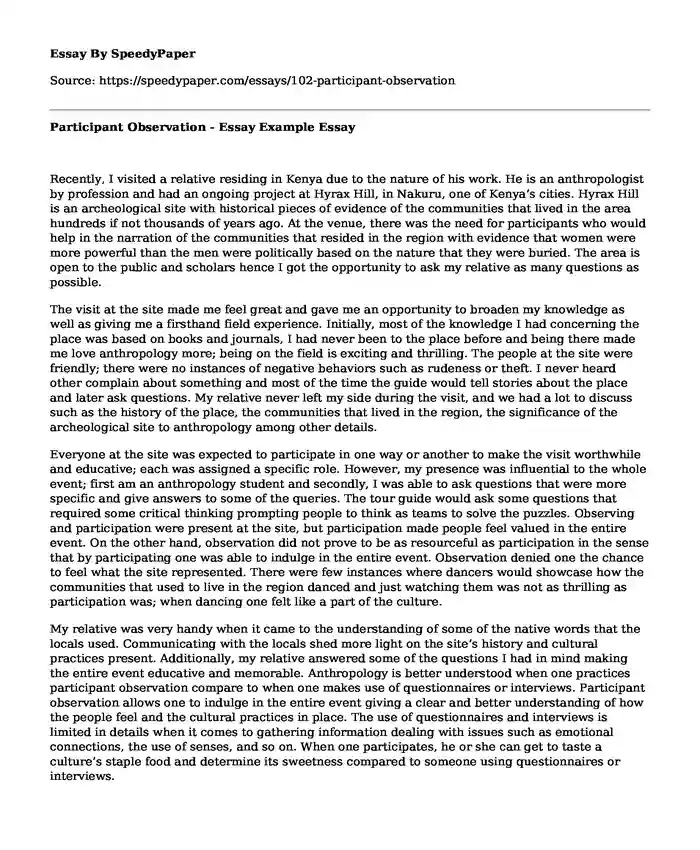
| Type of paper: | Essay |
| Categories: | Research Anthropology |
| Pages: | 4 |
| Wordcount: | 860 words |
Recently, I visited a relative residing in Kenya due to the nature of his work. He is an anthropologist by profession and had an ongoing project at Hyrax Hill, in Nakuru, one of Kenya’s cities. Hyrax Hill is an archeological site with historical pieces of evidence of the communities that lived in the area hundreds if not thousands of years ago. At the venue, there was the need for participants who would help in the narration of the communities that resided in the region with evidence that women were more powerful than the men were politically based on the nature that they were buried. The area is open to the public and scholars hence I got the opportunity to ask my relative as many questions as possible.
The visit at the site made me feel great and gave me an opportunity to broaden my knowledge as well as giving me a firsthand field experience. Initially, most of the knowledge I had concerning the place was based on books and journals, I had never been to the place before and being there made me love anthropology more; being on the field is exciting and thrilling. The people at the site were friendly; there were no instances of negative behaviors such as rudeness or theft. I never heard other complain about something and most of the time the guide would tell stories about the place and later ask questions. My relative never left my side during the visit, and we had a lot to discuss such as the history of the place, the communities that lived in the region, the significance of the archeological site to anthropology among other details.
Everyone at the site was expected to participate in one way or another to make the visit worthwhile and educative; each was assigned a specific role. However, my presence was influential to the whole event; first am an anthropology student and secondly, I was able to ask questions that were more specific and give answers to some of the queries. The tour guide would ask some questions that required some critical thinking prompting people to think as teams to solve the puzzles. Observing and participation were present at the site, but participation made people feel valued in the entire event. On the other hand, observation did not prove to be as resourceful as participation in the sense that by participating one was able to indulge in the entire event. Observation denied one the chance to feel what the site represented. There were few instances where dancers would showcase how the communities that used to live in the region danced and just watching them was not as thrilling as participation was; when dancing one felt like a part of the culture.
My relative was very handy when it came to the understanding of some of the native words that the locals used. Communicating with the locals shed more light on the site’s history and cultural practices present. Additionally, my relative answered some of the questions I had in mind making the entire event educative and memorable. Anthropology is better understood when one practices participant observation compare to when one makes use of questionnaires or interviews. Participant observation allows one to indulge in the entire event giving a clear and better understanding of how the people feel and the cultural practices in place. The use of questionnaires and interviews is limited in details when it comes to gathering information dealing with issues such as emotional connections, the use of senses, and so on. When one participates, he or she can get to taste a culture’s staple food and determine its sweetness compared to someone using questionnaires or interviews.
However, questionnaires and interviews can be better than participant observation when time is limited or when security is an issue. Unlike participant observation where one indulges in the event fully, questionnaires and interviews limit a researcher’s exposure to threatening scenarios. Moreover, when researching on various elements in an event such as, how people feel about something, what they would love different, and much more the use of questionnaires and interviews comes in handy compared to participant observation. A good researcher incorporates the use of an amalgamation of the three techniques to collect as much data as possible. The amalgamation of the three techniques sheds more light into the data retrieved compared to when each technique is used solely.
Conclusively, participant observation is an ideal technique since it adds detail to the data collected by a researcher. In participant observation, one can interact with the sample set hence experiencing a firsthand experience that is not possible when using questionnaires or interviews. Hyrax Hill in Nakuru, Kenya, is a place I would recommend anthropologists to visit due to its vast share of knowledge and experience. Moreover, it is suitable to have a tour guide or an acquaintance familiar with the place to make the experience worthwhile and educative. A researcher’s findings are as accurate as the effort the researcher put in retrieving the information hence an amalgamation of various techniques makes the research findings more concrete.
Cite this page
Participant Observation - Essay Example. (2018, Feb 01). Retrieved from https://speedypaper.com/essays/102-participant-observation
Request Removal
If you are the original author of this essay and no longer wish to have it published on the SpeedyPaper website, please click below to request its removal:
- Free Essay on Female Characters and References in Shakespeare's Play Macbeth
- Historical Essay Example: Columbian Exchange Facts
- Application Letter Sample for Master's Program in Clinical Mental Health Counseling
- Free Essay: Teaching Plan for Diabetes Mellitus Type 1
- Nissan Company Essay Sample
- Essay Sample on Role of Electoral Politics in Shaping Democracy
- Essay Sample on Why Black Businesses Fail
Popular categories




